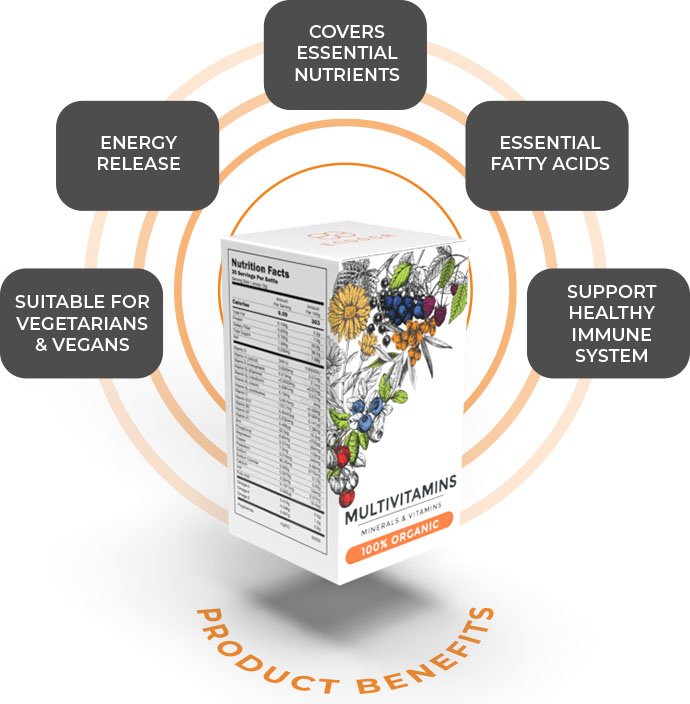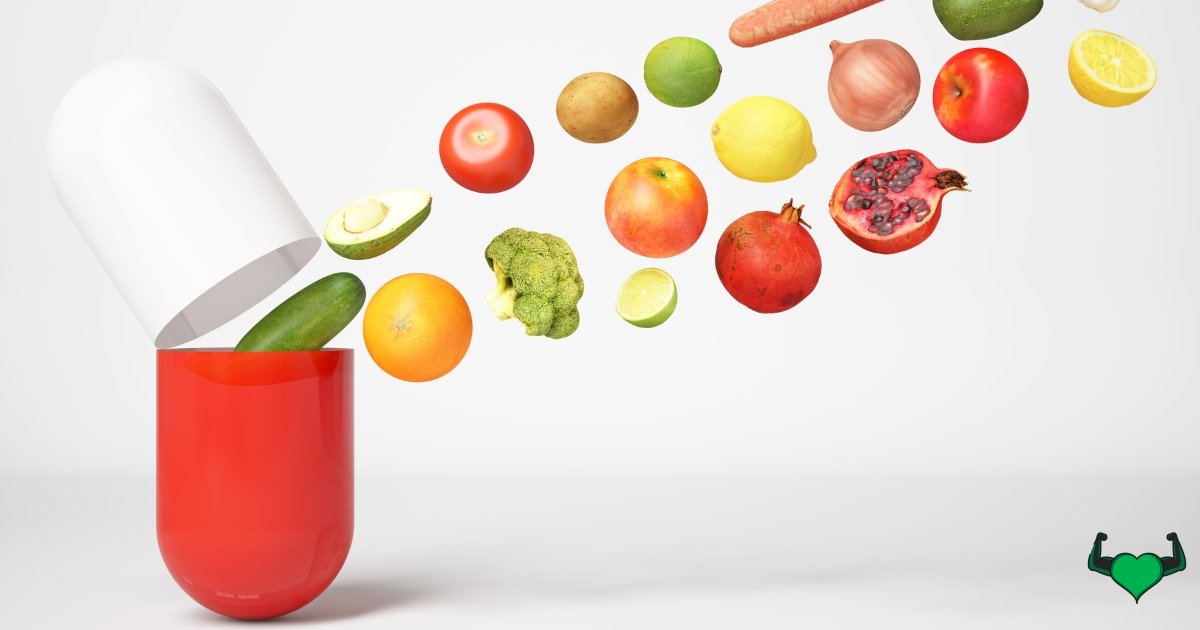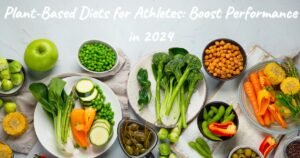Are you struggling to find the right multivitamin to meet your vegan dietary needs? You’re not alone! With the rise of plant-based diets, finding a supplement that covers all essential vitamins and minerals is crucial. But don’t worry, we’ve got you covered! In this guide, we’ll dive into the best vegan multivitamins of 2024, ensuring you make an informed decision that supports your health and lifestyle. Whether you’re concerned about B12, iron, or omega-3s, we’ve rounded up the best options to keep you thriving on a plant-based diet.
Table of Contents
Why Do Vegans Need Multivitamins?
Vegans often need multivitamins because certain essential nutrients that are easily found in animal products can be harder to obtain from a plant-based diet. While a well-planned vegan diet can provide most nutrients, some vitamins and minerals may be lacking or more challenging to absorb from plant sources. That’s where the best vegan multivitamins come into play, ensuring you cover all your bases for optimal health.
One of the most common concerns is vitamin B12, which is primarily found in animal products. B12 is crucial for nerve function, red blood cell formation, and DNA synthesis. Without it, vegans can develop deficiencies over time, leading to fatigue, weakness, or even neurological issues. Multivitamins with B12 derived from vegan-friendly sources are essential for maintaining healthy B12 levels.
Another vital nutrient is vitamin D3. While sunlight exposure helps produce vitamin D, many people, including vegans, may not get enough—especially in colder months. Most vitamin D supplements come from animal sources, but the best vegan multivitamins now include D3 derived from lichen, making them suitable for vegans.
Iron is another concern, as plant-based iron (non-heme iron) isn’t as easily absorbed as the heme iron found in meat. Supplementing with iron can help vegans avoid deficiencies that lead to anemia.
Omega-3 fatty acids, typically found in fish, are important for heart and brain health. Luckily, vegan sources like algae provide these essential fats, and high-quality vegan multivitamins often include omega-3 from algae oil.
In summary, while a plant-based diet has many health benefits, incorporating a vegan multivitamin helps ensure that you’re meeting your daily requirements for essential nutrients like B12, D3, iron, and omega-3s, which might otherwise be difficult to get.

Key Nutrients to Look for in Vegan Multivitamins
When choosing the best vegan multivitamins, it’s important to focus on key nutrients that may be harder to obtain from a plant-based diet. These nutrients are essential for overall health, and a well-rounded multivitamin ensures you don’t miss out on anything vital. Here are the top nutrients to look for:
1. Vitamin B12
B12 is one of the most crucial vitamins for vegans, as it’s typically found in animal products. It’s essential for nerve health, red blood cell formation, and DNA synthesis. The best vegan multivitamins will provide B12 in a bioavailable form like methylcobalamin to support these critical functions.
2. Vitamin D3
While many people can produce vitamin D through sun exposure, it’s not always enough—especially for vegans. Most traditional supplements derive D3 from lanolin (sheep’s wool), so look for vegan D3 sourced from lichen. This nutrient is vital for bone health, immune function, and mood regulation.
3. Iron
Vegans often consume non-heme iron, which is less efficiently absorbed than the heme iron found in meat. Iron is critical for energy production and transporting oxygen in the blood. Choose multivitamins that offer iron in a form that’s gentle on the stomach and easily absorbed.
4. Omega-3 Fatty Acids
While omega-3s are abundant in fish, vegan options can be found in algae-based supplements. Omega-3 fatty acids like DHA and EPA support brain, heart, and eye health. The best vegan multivitamins will often include omega-3s from algae to ensure you get these essential fats.
5. Calcium
Although calcium is found in plant foods like leafy greens and fortified plant milks, a multivitamin can help ensure adequate intake, especially for those who avoid fortified foods. Calcium supports bone density and overall skeletal health, which is crucial for vegans.
6. Zinc
Zinc is another important mineral that supports immune function, wound healing, and cell division. Plant-based sources of zinc are not as bioavailable as those from animal products, so it’s important to supplement to avoid a deficiency.
7. Iodine
Iodine is essential for thyroid health and metabolism regulation. Since iodized salt is not always part of a healthy vegan diet, and plant-based sources of iodine can be inconsistent, a vegan multivitamin with iodine can ensure you maintain healthy thyroid function.
8. Vitamin K2
Vitamin K2 is key for heart and bone health, and while K1 is found in leafy greens, K2 is harder to find in plant-based sources. The best vegan multivitamins may include K2 derived from fermented sources like natto or synthetic forms that are vegan-friendly.
When looking for the best vegan multivitamin, make sure it includes these essential nutrients to ensure a balanced intake. This will help fill any nutritional gaps in your vegan diet and support long-term health and well-being.
Top 6 Best Vegan Multivitamins in 2024
Choosing the best vegan multivitamins in 2024 can be a challenge with so many options on the market. To help you make an informed decision, we’ve rounded up the top five multivitamins that offer comprehensive nutritional support for those following a plant-based lifestyle. These products stand out for their high-quality ingredients, third-party testing, and commitment to vegan-friendly formulations.
1.ENDOCA Organic Multivitamins and Minerals
Endoca Organic Multivitamins is a plant-based supplement designed to support overall health with natural, organic ingredients. It’s made with whole food sources and is tailored for vegans looking for clean, high-quality nutrition.

Key Features:
- 100% organic and vegan-friendly
- Whole food-derived vitamins and minerals
- Free from synthetic additives and preservatives
- Gluten-free, non-GMO, and allergen-free
- Contains essential nutrients like vitamin C, B-complex, and iron
- Environmentally-friendly packaging
This multivitamin is ideal for those seeking a natural, clean source of daily nutrition support from organic plant ingredients.
2. Future Kind Essential Vegan Multivitamin
Future Kind has quickly become a leader in the vegan supplement world. This multivitamin is designed specifically for vegans, focusing on the nutrients that are often lacking in a plant-based diet—like vitamin B12, D3, and omega-3s from algae oil. It also includes iodine for thyroid support and zinc for immune health. Future Kind’s multivitamin is easy to take, with just two small capsules per day, and is free from artificial additives and fillers.
Key Features:
- Vegan B12, D3 (from lichen), and omega-3 (from algae)
- Third-party tested for purity
- Eco-friendly packaging
3. Garden of Life Vitamin Code Raw One for Women/Men
Garden of Life offers a comprehensive multivitamin specifically tailored for women and men. This raw, whole-food-based multivitamin includes B12, D3, iron, and probiotics to support digestive health, making it a well-rounded option for vegans. It’s also formulated with over 20 fruits and vegetables for added antioxidant benefits.
Key Features:
- Whole-food-based nutrients
- Includes probiotics for gut health
- Non-GMO and gluten-free
4. MyKind Organics Vegan Multivitamin Gummies
For those who prefer gummies, MyKind Organics offers one of the best vegan multivitamins in a delicious, chewable form. These certified organic gummies are made from real fruit and include a full spectrum of vitamins and minerals like B12, D3, and zinc. They are also gelatin-free, making them suitable for vegans, and are sweetened with organic tapioca syrup.
Key Features:
- Organic and non-GMO
- Easy-to-take gummy form
- Includes a wide range of essential vitamins and minerals
5. Deva Vegan Multivitamin & Mineral Supplement
Deva’s vegan multivitamin is a budget-friendly option that doesn’t compromise on quality. It provides all the essential nutrients a vegan might need, including B12, D3, iron, zinc, and calcium. While it doesn’t have the higher doses of omega-3s found in other supplements, it’s a solid, affordable choice for anyone looking to cover their basic nutritional needs.
Key Features:
- Affordable and widely available
- Comprehensive vitamin and mineral profile
- Free from artificial colors and flavors
6. Ritual Essential Multivitamin for Women/Men
Ritual’s minimalist approach to multivitamins makes it stand out. Designed with transparency in mind, each capsule contains nine essential nutrients, including B12, D3, iron, and omega-3s from algae. What makes Ritual unique is its clean, traceable ingredient sourcing and delayed-release capsules, which help with better absorption and digestion.
Key Features:
- Traceable, high-quality ingredients
- Omega-3s from algae oil
- Delayed-release capsule for optimal absorption
These best vegan multivitamins of 2024 have been chosen for their focus on key nutrients like B12, D3, iron, and omega-3s, as well as their commitment to using vegan-friendly, high-quality ingredients. Whether you’re looking for a budget option, a gummy format, or a multivitamin packed with additional probiotics and antioxidants, there’s something for everyone in this list.
How to Choose the Right Vegan Multivitamin for You
Choosing the best vegan multivitamin for your needs can feel overwhelming with so many options available. However, by focusing on a few key factors, you can find the perfect fit for your dietary and health requirements. Here’s how to make the right choice:
1. Assess Your Nutritional Needs
Everyone has different health needs based on factors like age, gender, lifestyle, and diet. For example, vegans often need to focus on key nutrients like B12, D3, iron, and omega-3s—nutrients that may be less abundant in plant-based diets. If you’re lacking in energy, you might want a multivitamin that provides higher doses of B12 or iron. For bone health, look for a multivitamin with calcium and vitamin K2.
2. Look at the Form of Nutrients
Not all nutrient forms are created equal. The best vegan multivitamins will use bioavailable forms of vitamins and minerals that are easier for your body to absorb. For example:
- Vitamin B12 should be in the form of methylcobalamin, which is more easily absorbed than cyanocobalamin.
- Vitamin D3 should come from vegan sources like lichen, rather than the common animal-based D3 from lanolin.
- Iron should be in a gentle, non-constipating form, such as ferrous bisglycinate.
3. Consider Your Dietary Restrictions
If you have additional dietary restrictions, such as avoiding gluten, soy, or artificial additives, you’ll want to choose a multivitamin that aligns with those needs. The best vegan multivitamins are often free from common allergens and artificial fillers. Look for certifications like “gluten-free,” “soy-free,” or “non-GMO” on the label.
4. Choose the Right Format
Vegan multivitamins come in various formats: capsules, tablets, gummies, and even liquids. Think about what format works best for you:
- Capsules: Great for people who want a straightforward, no-frills supplement.
- Gummies: Ideal for those who struggle with swallowing pills, but be mindful of added sugars.
- Liquids: Excellent for those who want fast absorption or have difficulty with pills, but may require refrigeration.
5. Check for Certifications
To ensure you’re getting a product that meets high standards, look for third-party testing and certifications like “Certified Vegan,” “Non-GMO,” or “USP Verified.” These certifications confirm that the product contains exactly what it claims, without hidden animal-derived ingredients or contaminants.
6. Tailor to Your Life Stage and Goals
Your stage in life will affect your nutrient needs. For example:
- Women of childbearing age might need more iron and folate.
- Seniors may benefit from higher doses of B12, D3, and calcium for bone health.
- Athletes on a vegan diet may need additional zinc, magnesium, or omega-3 fatty acids to support energy levels and muscle recovery.
7. Read Customer Reviews and Recommendations
Research and read customer reviews to see how the multivitamin performs for others. Many people share their experiences about improved energy, digestion, or overall well-being. Reviews can also help you identify potential downsides, such as aftertaste or side effects.
8. Consult with a Healthcare Provider
Before starting any new supplement, it’s always a good idea to check with a healthcare professional. They can help assess your specific needs, run blood tests if necessary, and recommend the right dosage and type of multivitamin.
By considering these factors, you can confidently choose the best vegan multivitamin that fits your health goals, lifestyle, and dietary needs. Whether you prioritize specific nutrients, certifications, or pill formats, finding the right multivitamin ensures you’re fully supporting your plant-based diet.

Are Vegan Multivitamins Safe?
Yes, vegan multivitamins are generally safe when chosen wisely and used as directed. Like any supplement, the safety of vegan multivitamins depends on the quality of the product and the individual’s specific health needs. Here’s what you need to know to ensure you’re picking the best vegan multivitamins that are both safe and effective.
1. Quality of Ingredients
The best vegan multivitamins are made with high-quality, plant-based ingredients and avoid common allergens like gluten, soy, or artificial additives. You want to look for products that clearly state their sources for vitamins like B12 (methylcobalamin) and D3 (from lichen). Avoid products that use unnecessary fillers or synthetic ingredients, as these can cause reactions in sensitive individuals. Always choose brands that are transparent about their ingredient sourcing and manufacturing processes.
2. Third-Party Testing and Certification
To ensure safety, it’s important to choose a multivitamin that has been third-party tested. This means the product has undergone independent testing to verify its purity, potency, and safety. Look for certifications such as:
- USP Verified: Ensures the product meets quality standards.
- Non-GMO Project Verified: Confirms that the product does not contain genetically modified ingredients.
- Certified Vegan: Guarantees that the product contains no animal-derived ingredients.
These certifications provide extra assurance that the product is free from harmful contaminants and meets high safety standards.
3. Avoiding Over-Supplementation
While multivitamins are safe, over-supplementing certain vitamins and minerals can cause side effects. For example, excessive iron supplementation can lead to digestive issues, and too much vitamin D can result in toxicity. The best vegan multivitamins will offer balanced dosages that cover your daily needs without going overboard. Always follow the recommended serving size on the label unless directed otherwise by a healthcare professional.
4. Allergen-Free and Non-Toxic
Many vegan multivitamins are designed to be allergen-free, which means they are free from gluten, dairy, soy, and other common allergens. Additionally, they should be free of synthetic dyes, preservatives, or artificial flavorings that could cause unwanted side effects. This makes vegan multivitamins generally safer for people with food sensitivities or allergies.
5. Specific Nutrient Safety
Vegan multivitamins are formulated with the unique needs of plant-based diets in mind, often focusing on nutrients that can be lacking, like B12, D3, omega-3s, iron, and zinc. These nutrients are perfectly safe when consumed at recommended levels, and they are essential for vegans to prevent deficiencies. Just ensure you are not doubling up by taking additional individual supplements that contain these same nutrients unless advised by a doctor.
6. Consulting with a Healthcare Provider
As with any supplement, it’s a good idea to consult with your healthcare provider before starting a vegan multivitamin. They can help you determine whether you need additional vitamins and minerals, or if the multivitamin you’re considering contains the right amounts for your body. A doctor may also recommend blood tests to check your levels of key nutrients like B12 and iron.
In conclusion, vegan multivitamins are safe when you select high-quality, third-party tested products that match your nutritional needs. The best vegan multivitamins offer balanced doses of essential nutrients like B12, D3, iron, and omega-3s, ensuring you stay healthy while maintaining a plant-based diet. By following dosage guidelines and choosing well-formulated products, vegan multivitamins can be a safe and effective addition to your daily routine.
Vegan Multivitamins vs. Whole Foods: Which is Better?
When it comes to staying healthy on a plant-based diet, there’s often a debate about whether you should rely on vegan multivitamins or aim to get all your nutrients from whole foods. Both have their benefits, and understanding the pros and cons of each can help you make the best decision for your health.
Whole Foods: The Power of Natural Nutrition
Whole, plant-based foods are packed with vitamins, minerals, antioxidants, and fiber, all of which are essential for optimal health. By eating a varied and balanced vegan diet rich in fruits, vegetables, whole grains, nuts, seeds, and legumes, you can meet many of your nutrient needs naturally.
- Bioavailability: Nutrients from whole foods are often more bioavailable, meaning your body can absorb and use them more efficiently than synthetic versions in supplements.
- Phytonutrients: Whole foods provide a wide range of phytonutrients (plant compounds) that are not found in supplements, offering additional health benefits like reducing inflammation and fighting free radicals.
- Balanced nutrition: Eating a diet rich in whole foods ensures you get a broad spectrum of nutrients, fiber, and healthy fats in their natural form, which work together to support your overall health.
However, there are a few downsides:
- Some essential nutrients, such as vitamin B12, are almost impossible to get from plant foods alone. B12 is primarily found in animal products, so even with a whole foods diet, supplementation is often necessary for vegans.
- Other nutrients, like vitamin D (especially D3), iron, and omega-3 fatty acids, can be harder to obtain in sufficient amounts from plant-based sources, particularly for people with specific dietary needs or restricted access to fortified foods.

Vegan Multivitamins: A Convenient Safety Net
For many vegans, the best vegan multivitamins offer a convenient solution to ensure they’re meeting their daily requirements, especially for nutrients that are scarce in plant-based foods. Here’s why they can be a good choice:
- Convenience: Multivitamins are an easy way to ensure you’re not missing out on key nutrients like B12, D3, iron, and omega-3s. Rather than worrying about tracking every nutrient in your diet, a multivitamin can fill in any gaps.
- Targeted nutrition: Vegan multivitamins are specifically formulated to address common nutrient deficiencies in plant-based diets. The best vegan multivitamins include bioavailable forms of nutrients like methylcobalamin (B12) and algae-derived omega-3s, which are easier for your body to use.
- Peace of mind: Taking a vegan multivitamin can provide extra reassurance that you’re meeting your daily nutritional needs, particularly during busy periods when meal planning might take a backseat.
But there are a few considerations:
- Whole foods are still essential: While vegan multivitamins can help cover specific nutrient gaps, they don’t provide the complete range of health benefits that whole foods do, such as fiber, antioxidants, and phytonutrients.
- Quality matters: Not all multivitamins are created equal. You need to ensure you’re selecting the best vegan multivitamins, free from synthetic additives and packed with bioavailable forms of nutrients.
Which Is Better?
In an ideal world, a balanced plant-based diet full of whole foods is the best foundation for health. Whole foods provide the most natural and effective way to get most of your vitamins, minerals, and other nutrients. However, due to the limitations of certain nutrients in a vegan diet—particularly B12, D3, and omega-3s—supplementing with a high-quality vegan multivitamin can help ensure you’re not missing anything crucial.
Ultimately, it’s not about choosing one over the other. A combination of a whole foods diet and a reliable vegan multivitamin can be the most effective approach to supporting your overall health and well-being. Whole foods provide the foundation, and multivitamins serve as a safety net for those harder-to-get nutrients.
Conclusion
Choosing the best vegan multivitamin is essential for maintaining a well-balanced, healthy plant-based lifestyle. By focusing on key nutrients like B12, D3, and omega-3s, you can ensure your body gets what it needs to thrive. Take the next step toward your health goals and select the multivitamin that’s best for you. Don’t wait—start optimizing your plant-based diet today!






Pingback: Top 10 Best Kitchen Gadgets for Vegan Meal Prep in 2024 - VitalityFitHub